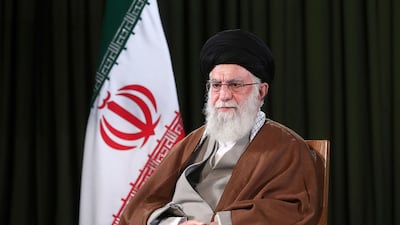Iran's supreme leader on Sunday refused US assistance to fight the new coronavirus, citing an unfounded conspiracy theory that the pathogen could be manmade by America.
Ayatollah Ali Khamenei’s comments come as Iran faces crushing US sanctions blocking the country from selling crude oil and accessing international financial markets.
But while Iranian civilian officials in recent days have increasingly criticised the sanctions, Mr Khamenei, 80, instead chose to agree to the same conspiracy theory used by China about the new coronavirus to deflect blame for the pandemic.
"Possibly your [offered] medicine is a way to spread the virus more," Mrhamenei said. "Or if you send therapists and doctors, maybe he wants to see the effect of the poison, since it is said that part of the virus is built for Iran."
There is no scientific proof offered anywhere in the world to support Mr Khamenei's comments.
Mr Khamenei made the comments in a speech broadcast on Sunday across Iran marking Nowruz, the Persian New Year. He had called off his usual speech at Imam Reza shrine in Mashhad over the virus outbreak.
The leader's comments come as Iran has more than 20,600 confirmed cases of the new coronavirus and 1,556 reported deaths.
Iran is one of the hardest-hit countries in the world by Covid-19. Across the Middle East, Iran represents eight out of 10 cases of the infections and those leaving the Islamic republic have carried the virus to other countries.
Mr Khamenei and President Hassan Rouhani have promised the country will overcome the outbreak but have still refused to impose heavy restrictions.
Mr Rouhani on Saturday said authorities' efforts to combat the Covid-19 pandemic would produce significant results within 15 days.
Despite the increasing toll, Mr Rouhani said the government's response to the virus is producing "a lot of impact", indicating "the situation will change automatically within 10 to 15 days" if "everyone observes the directives", the presidency said.
The Islamic republic is among the three countries hardest hit by Covid-19, with an official death toll behind only those of Italy and China. In contrast with these countries, Iran has not enforced isolation measures.
“The principle is that, as much as possible, people do not leave their homes,” Mr Rouhani said. He also urged “shopping centres where large numbers of people gather” to close.
The country's largest shopping centre, Iran Mall, located in the west of the capital Tehran, has closed and a section is being converted into a makeshift health centre to accommodate up to 3,000 patients, AFP reported.
The mortality rate from coronavirus in Iran is about 7.5 per cent and the rate of recovery 37 per cent, the figures provided by Jahanpour indicate.
A total of 7,635 people have recovered from the disease across the country, he said.
All 31 of Iran’s provinces have reported cases, with the north-eastern province of Semnan reporting the largest number of infections per capita.
For weeks, authorities have asked people to avoid travel in the run up to the Persian New Year holidays, which began on Friday. Large numbers of Iranians take to the roads for Nowruz to travel or visit relatives, and they continued to do so, ignoring government plea.

